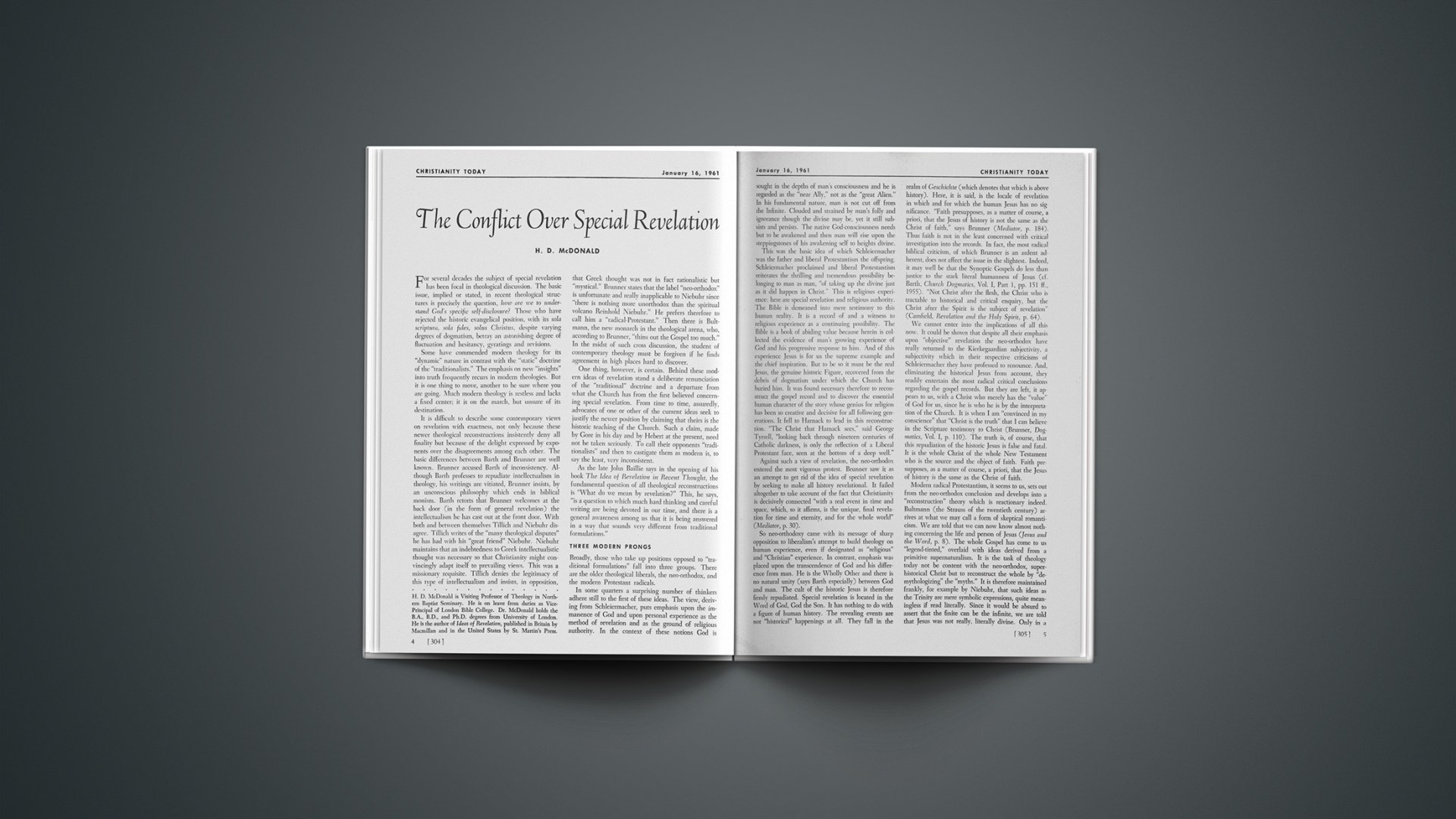For several decades the subject of special revelation has been focal in theological discussion. The basic issue, implied or stated, in recent theological structures is precisely the question, how are we to understand God’s specific self-disclosure? Those who have rejected the historic evangelical position, with its sola scriptura, sola fides, solus Christus, despite varying degrees of dogmatism, betray an astonishing degree of fluctuation and hesitancy, gyratings and revisions.
Some have commended modern theology for its “dynamic” nature in contrast with the “static” doctrine of the “traditionalists.” The emphasis on new “insights” into truth frequently recurs in modern theologies. But it is one thing to move, another to be sure where you are going. Much modern theology is restless and lacks a fixed center; it is on the march, but unsure of its destination.
It is difficult to describe some contemporary views on revelation with exactness, not only because these newer theological reconstructions insistently deny all finality but because of the delight expressed by exponents over the disagreements among each other. The basic differences between Barth and Brunner are well known. Brunner accused Barth of inconsistency. Although Barth professes to repudiate intellectualism in theology, his writings are vitiated, Brunner insists, by an unconscious philosophy which ends in biblical monism. Barth retorts that Brunner welcomes at the back door (in the form of general revelation) the intellectualism he has cast out at the front door. With both and between themselves Tillich and Niebuhr disagree. Tillich writes of the “many theological disputes” he has had with his “great friend” Niebuhr. Niebuhr maintains that an indebtedness to Greek intellectualistic thought was necessary so that Christianity might convincingly adapt itself to prevailing views. This was a missionary requisite. Tillich denies the legitimacy of this type of intellectualism and insists, in opposition, that Greek thought was not in fact rationalistic but mystical.” Brunner states that the label “neo-orthodox” is unfortunate and really inapplicable to Niebuhr since “there is nothing more unorthodox than the spiritual volcano Reinhold Niebuhr.” He prefers therefore to call him a “radical-Protestant.” Then there is Bultmann, the new monarch in the theological arena, who, according to Brunner, “thins out the Gospel too much.” In the midst of such cross discussion, the student of contemporary theology must be forgiven if he finds agreement in high places hard to discover.
One thing, however, is certain. Behind these modern ideas of revelation stand a deliberate renunciation of the “traditional” doctrine and a departure from what the Church has from the first believed concerning special revelation. From time to time, assuredly, advocates of one or other of the current ideas seek to justify the newer position by claiming that theirs is the historic teaching of the Church. Such a claim, made by Gore in his day and by Hebert at the present, need not be taken seriously. To call their opponents “traditionalists” and then to castigate them as modern is, to say the least, very inconsistent.
As the late John Baillie says in the opening of his book The Idea of Revelation in Recent Thought, the fundamental question of all theological reconstructions is “What do we mean by revelation?” This, he says, “is a question to which much hard thinking and careful writing are being devoted in our time, and there is a general awareness among us that it is being answered in a way that sounds very different from traditional formulations.”
THREE MODERN PRONGS
Broadly, those who take up positions opposed to “traditional formulations” fall into three groups. There are the older theological liberals, the neo-orthodox, and the modern Protestant radicals.
In some quarters a surprising number of thinkers adhere still to the first of these ideas. The view, deriving from Schleiermacher, puts emphasis upon the immanence of God and upon personal experience as the method of revelation and as the ground of religious authority. In the context of these notions God is sought in the depths of man’s consciousness and he is regarded as the “near Ally,” not as the “great Alien.” In his fundamental nature, man is not cut off from the Infinite. Clouded and strained by man’s folly and ignorance though the divine may be, yet it still subsists and persists. The native God-consciousness needs but to be awakened and then man will rise upon the steppingstones of his awakening self to heights divine.
This was the basic idea of which Schleiermacher was the father and liberal Protestantism the offspring. Schleiermacher proclaimed and liberal Protestantism reiterates the thrilling and tremendous possibility belonging to man as man, “of taking up the divine just as it did happen in Christ.” This is religious experience: here are special revelation and religious authority. The Bible is demeaned into mere testimony to this human reality. It is a record of and a witness to religious experience as a continuing possibility. The Bible is a book of abiding value because herein is collected the evidence of man’s growing experience of God and his progressive response to him. And of this experience Jesus is for us the supreme example and the chief inspiration. But to be so it must be the real Jesus, the genuine historic Figure, recovered from the debris of dogmatism under which the Church has buried him. It was found necessary therefore to reconstruct the gospel record and to discover the essential human character of the story whose genius for religion has been so creative and decisive for all following generations. It fell to Harnack to lead in this reconstruction. “The Christ that Harnack sees,” said George Tyrrell, “looking back through nineteen centuries of Catholic darkness, is only the reflection of a Liberal Protestant face, seen at the bottom of a deep well.”
Against such a view of revelation, the neo-orthodox entered the most vigorous protest. Brunner saw it as an attempt to get rid of the idea of special revelation by seeking to make all history revelational. It failed altogether to take account of the fact that Christianity is decisively connected “with a real event in time and space, which, so it affirms, is the unique, final revelation for time and eternity, and for the whole world” (Mediator, p. 30).
So neo-orthodoxy came with its message of sharp opposition to liberalism’s attempt to build theology on human experience, even if designated as “religious” and “Christian” experience. In contrast, emphasis was placed upon the transcendence of God and his difference from man. He is the Wholly Other and there is no natural unity (says Barth especially) between God and man. The cult of the historic Jesus is therefore firmly repudiated. Special revelation is located in the Word of God, God the Son. It has nothing to do with a figure of human history. The revealing events are not “historical” happenings at all. They fall in the realm of Geschichte (which denotes that which is above history). Here, it is said, is the locale of revelation in which and for which the human Jesus has no significance. “Faith presupposes, as a matter of course, a priori, that the Jesus of history is not the same as the Christ of faith,” says Brunner (Mediator, p. 184). Thus faith is not in the least concerned with critical investigation into the records. In fact, the most radical biblical criticism, of which Brunner is an ardent adherent, does not affect the issue in the slightest. Indeed, it may well be that the Synoptic Gospels do less than justice to the stark literal humanness of Jesus (cf. Barth, Church Dogmatics, Vol. I, Part 1, pp. 151 ff., 1955). “Not Christ after the flesh, the Christ who is tractable to historical and critical enquiry, but the Christ after the Spirit is the subject of revelation” (Camfield, Revelation and the Holy Spirit, p. 64).
We cannot enter into the implications of all this now. It could be shown that despite all their emphasis upon “objective” revelation the neo-orthodox have really returned to the Kierkegaardian subjectivity, a subjectivity which in their respective criticisms of Schleiermacher they have professed to renounce. And, eliminating the historical Jesus from account, they readily entertain the most radical critical conclusions regarding the gospel records. But they are left, it appears to us, with a Christ who merely has the “value” of God for us, since he is who he is by the interpretation of the Church. It is when I am “convinced in my conscience” that “Christ is the truth” that I can believe in the Scripture testimony to Christ (Brunner, Dogmatics, Vol. I, p. 110). The truth is, of course, that this repudiation of the historic Jesus is false and fatal. It is the whole Christ of the whole New Testament who is the source and the object of faith. Faith presupposes, as a matter of course, a priori, that the Jesus of history is the same as the Christ of faith.
Modern radical Protestantism, it seems to us, sets out from the neo-orthodox conclusion and develops into a “reconstruction” theory which is reactionary indeed. Bultmann (the Strauss of the twentieth century) arrives at what we may call a form of skeptical romanticism. We are told that we can now know almost nothing concerning the life and person of Jesus (Jesus and the Word, p. 8). The whole Gospel has come to us “legend-tinted,” overlaid with ideas derived from a primitive supernaturalism. It is the task of theology today not be content with the neo-orthodox, super-historical Christ but to reconstruct the whole by “demythologizing” the “myths.” It is therefore maintained frankly, for example by Niebuhr, that such ideas as the Trinity are mere symbolic expressions, quite meaningless if read literally. Since it would be absurd to assert that the finite can be the infinite, we are told that Jesus was not really, literally divine. Only in a “gnostic, symbolic” sense can it be said that he died and rose again.
The upshot of this line of thought is that we are left with a new form of humanism in which revelation seems to be nothing much more than the unveiling to man of the ultimate divinity of his own being. This seems to us to be the conclusion of Tillich’s Systematic Theology, that is, if we understand him aright, or if he is really understandable at all. “Revelation,” he tells us, “is the manifestation of what concerns us ultimately” (Vol. I, p. 110). Everything is a bearer to man of such a revelation when it seizes him as a “miracle” and as “ecstacy,” thereby inducing an “elevation of heart.” Of this reality Christianity is the profoundest “symbol.” “A Christianity which does not assert that Jesus of Nazareth is sacrificed to Jesus as the Christ is just one more religion among many religions,” he says. But this too is “symbolic”; indeed, ’tis “symbol” all. The term “Son of God” is a symbol; so, too, is the term “God”; but a symbol of what? That we are not really told.
It need hardly be said that for all this “reconstruction” there is no authority whatsoever. Having renounced the thesis that divine revelation contains truths, Bultmann, Tillich, and Niebuhr are left with no rational basis for theology. They have failed to observe, what seems to us so clear in the biblical record, that the knowledge of God which is discovered by experience is not a knowledge which could have arisen in experience. Man’s encounter with God comes by way of the truth communicated to God’s chosen prophets and apostles. The acts of God and the word of God are not two separable realities. God’s acts are known only as they are interpreted by his word, and by his word we are brought into saving contact with his acts. Protestant radicalism has no objective Word of God, with the result that it flounders in the abyss of irrationalism and subjectivism.
Samuel M. Shoemaker is the author of a number of popular books and the gifted Rector of Calvary Episcopal Church in Pittsburgh. He is known for his effective leadership of laymen and his deeply spiritual approach to all vital issues.










